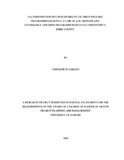| dc.description.abstract | The purpose of this study is to examine factors influencing sustainability of child welfare
programmes in Kenya; A case of Embu street children rescue Centre feeding
programmes. This study is guided by the following objectives: To assess how
organization factors influence sustainability of child welfare programmes in Manyatta
Constituency ;To determine how financial resources influences sustainability of child
welfare programmes in manyatta constituency; to determine how personnel factors
influences sustainability of child welfare programmes in manyatta constituency and to
examine how partnership with child protection agencies influences sustainability of child
welfare programmes in manyatta constituency. The study employed descriptive survey
research design and target population of this study comprised 120 stakeholders who are
involved in ensuring the programme is running as expected. The study used simple
random sampling method to allow full participation of the respondents. A sample size of
92 was obtained by using Yamane (1967; 886) simplified formula. Data was collected
from the identified respondents using questionnaires. Each question was be based on the
objective of the study and ensure that each question is relevant. The data was tabulated in
form of data matrices, data reduction and then discussed, this provides easy data
computation, easy data understanding and communication and extrapolation Generally,
both qualitative and quantitative research approaches was used for data analysis.The
study found out that 50(56%) of the participants strongly agreed that there is a clear and
well understood organizational structure in the organization,30(33%) agreed,6(7%)
neutral and 4(4%) disagree. On whether funding allocation of this project is flexible and
based on need ,62(69%) of the respondents strongly agreed,23(26%) agreed , 3(3%)
were neutral on the mater ,1(1%) of the respondents disagreed , 1(1%) of the respondent s
strongly disagreed . This implies that majority of the respondents agreed that funding
allocation of this project was flexible and based on need. On whether the staff in the
project are well qualifies , 63(70%) strongly agreed that it did, 20(22%) agreed ,5(6%) of
the respondents were neutral on the matter , 1(1%) disagreed while the remaining 1(1%)
of the respondents strongly disagreed. This implies that the majority of the respondents
agreed that the staffs in the project are well qualified. On whether the project has
partnered with other child welfare projects in the area 69(77%) of the respondents
strongly greed ,13(14%) agreed ,5(6%) were neutral on the matter 2(2%) disagreed while
the remaining 1(%) of the respondents strongly agreed . This implies that majority of the
respondents agreed that the project has partnered with other child welfare projects in the
area . | en_US |



